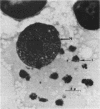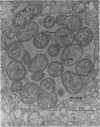Abstract
The ultrastructure of Ehrlichia canis was examined in both pulmonary mononuclear cells and in monocytes cultured from an infected dog. The cytoplasmic inclusions, or morulae, of E. canis consisted of a membrane-lined vacuole-containing elementary bodies which varied in size and number. The elementary bodies were bound by two trilamellar membranes. The organism shared morphological properties of both the genus Rickettsia and genus Chlamydia.
Full text
PDF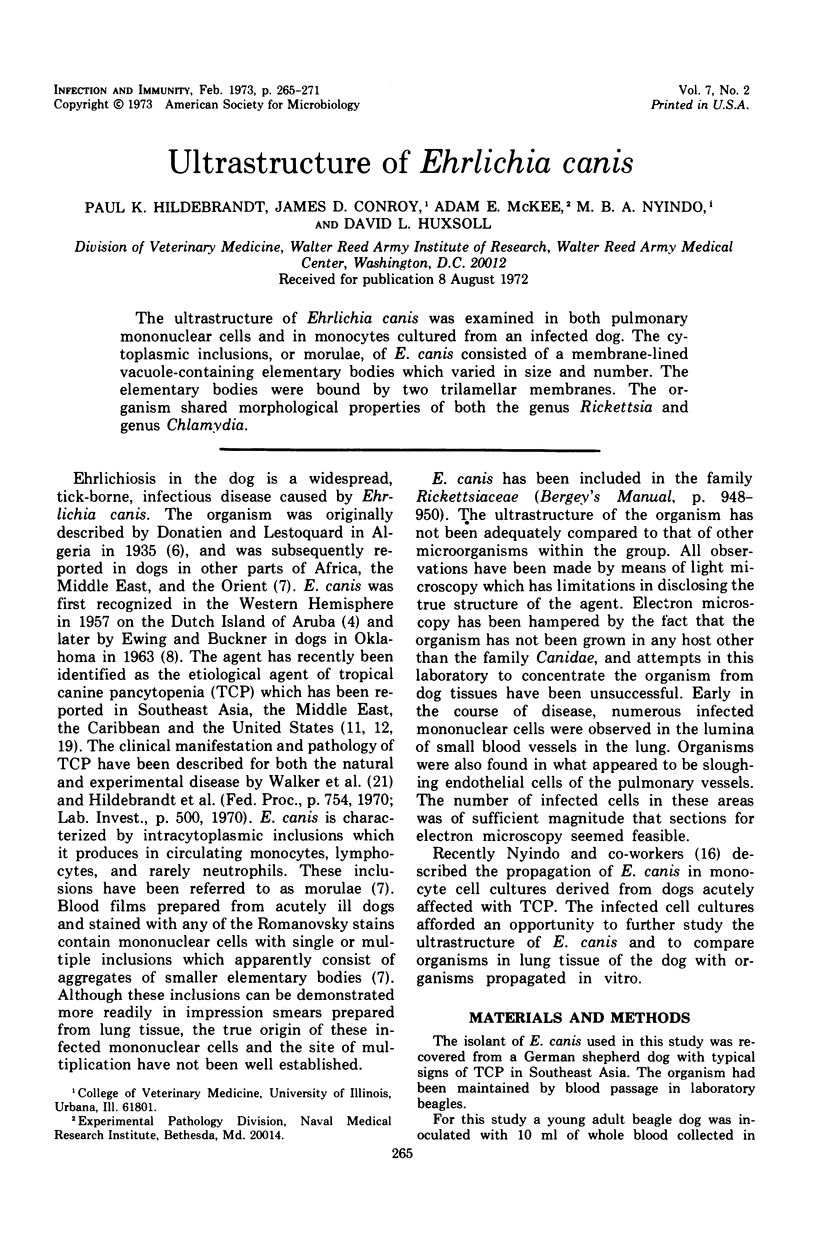
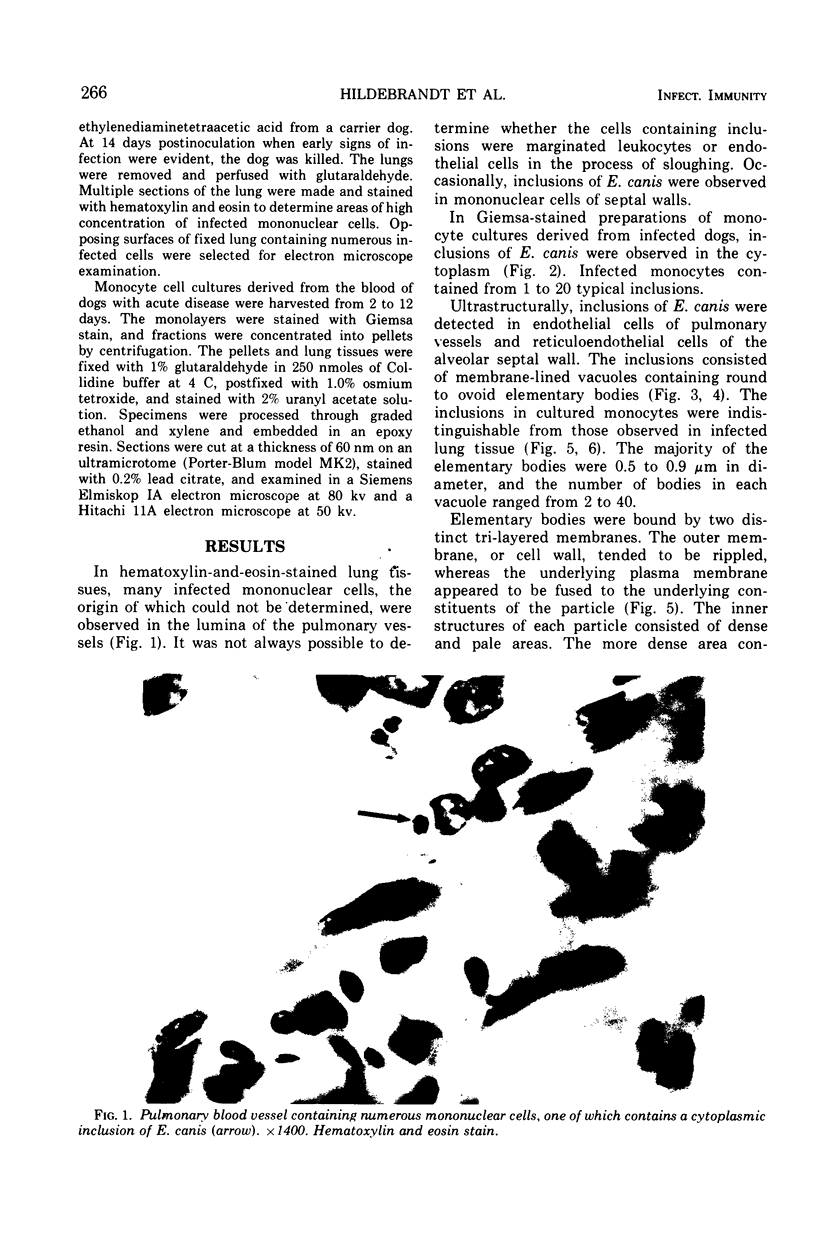
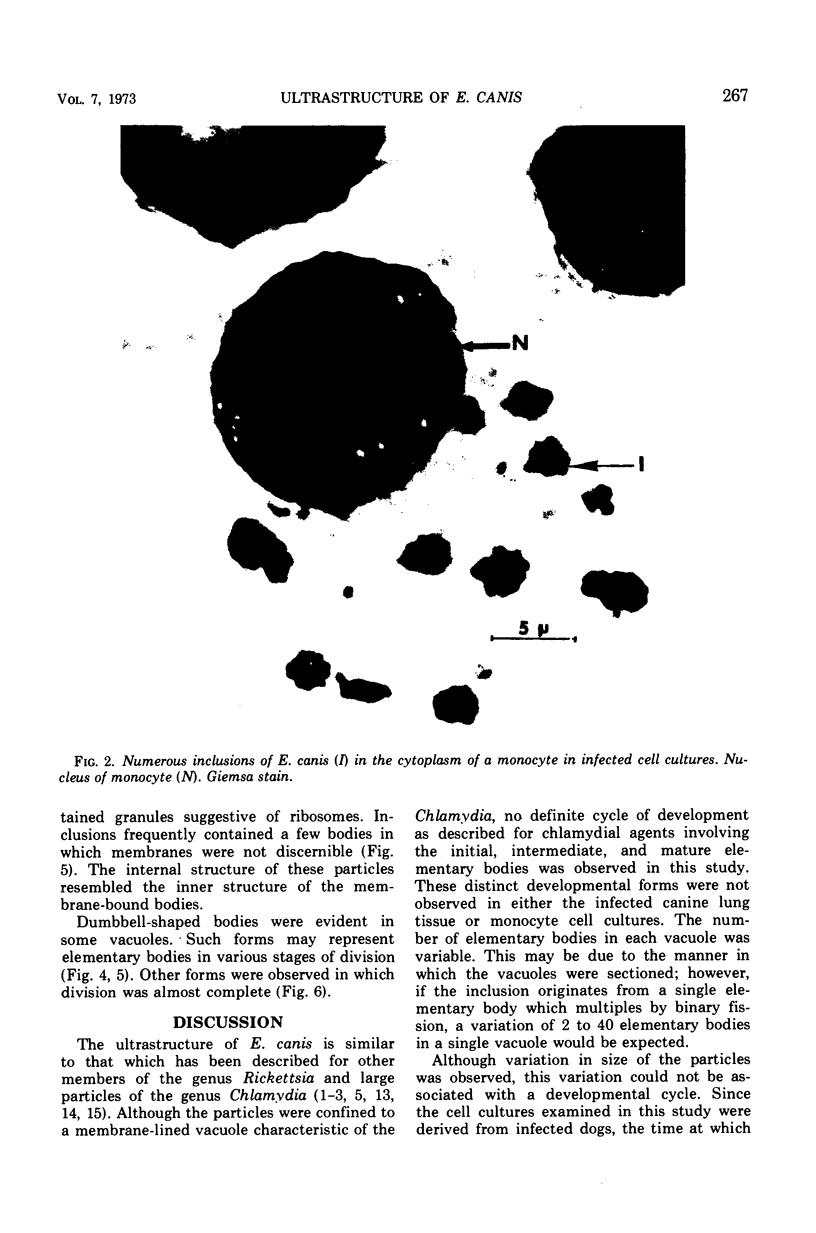
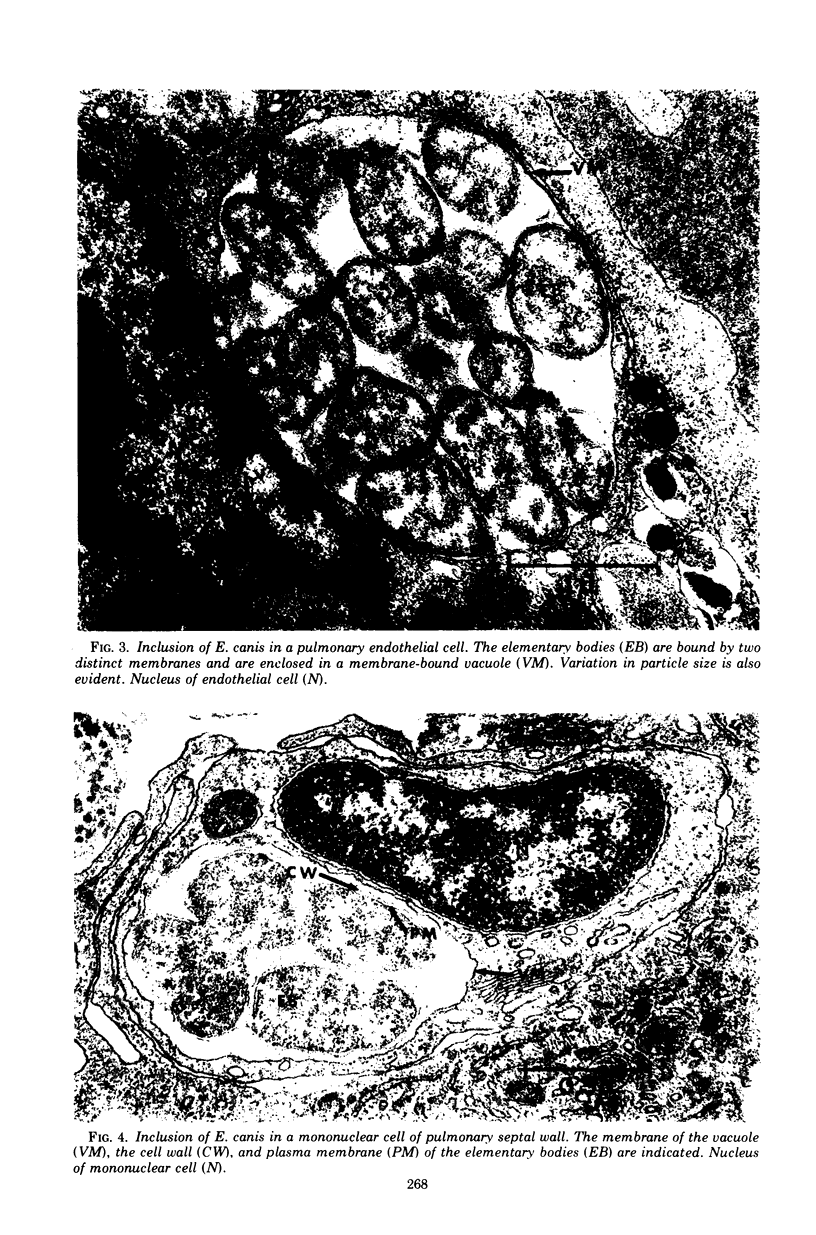
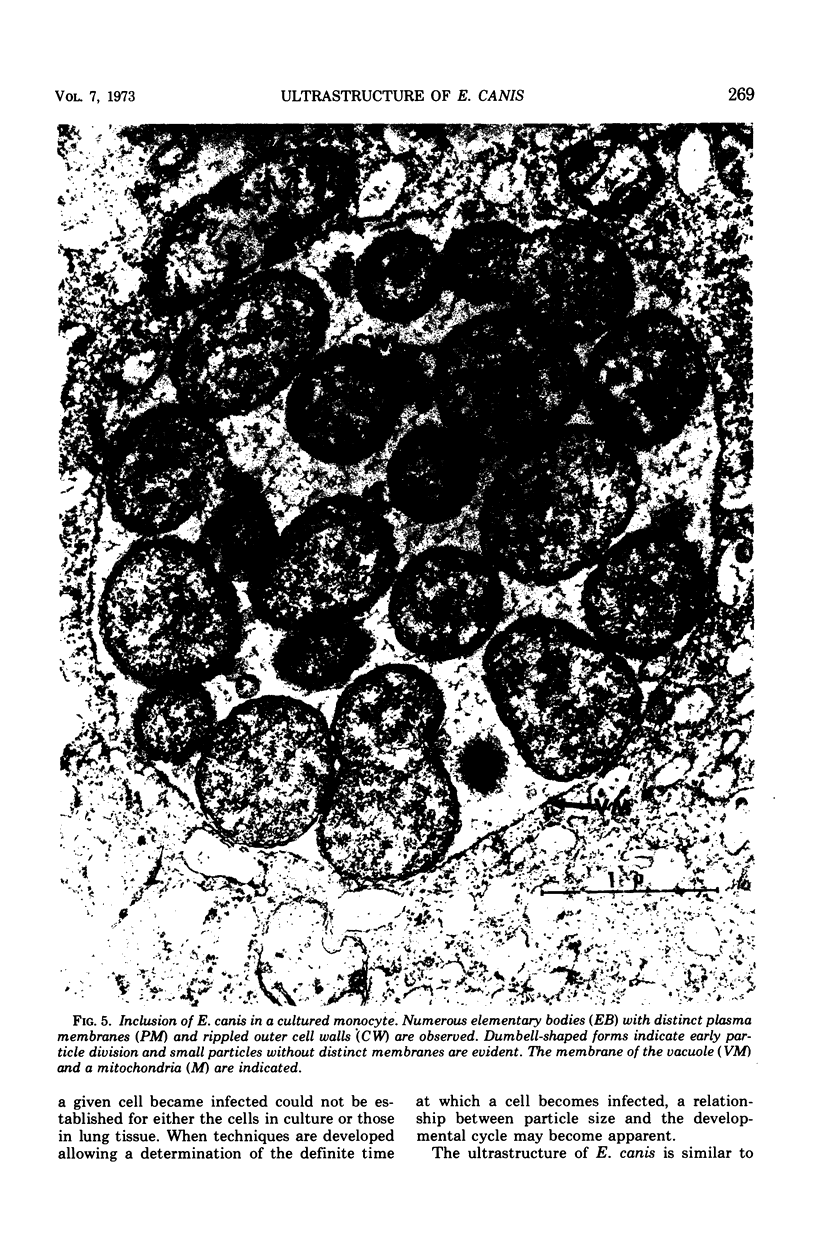
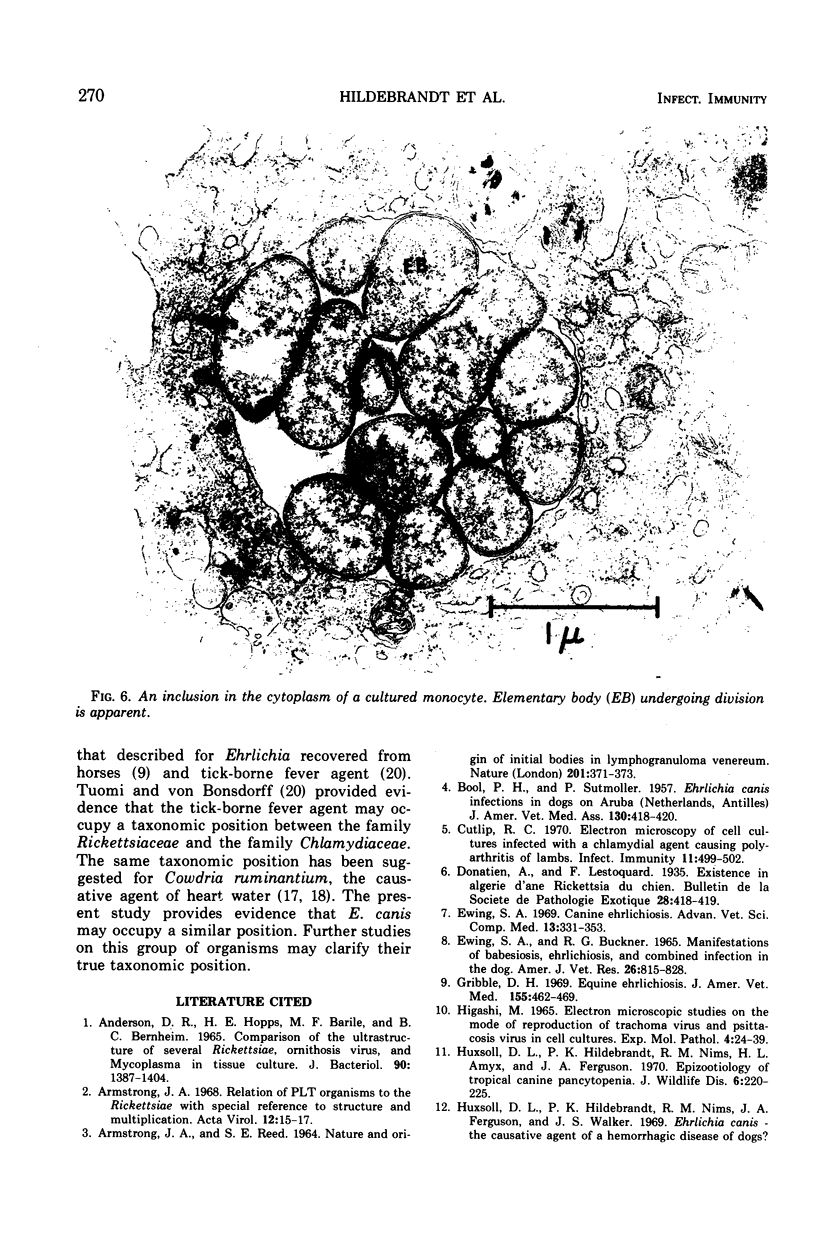
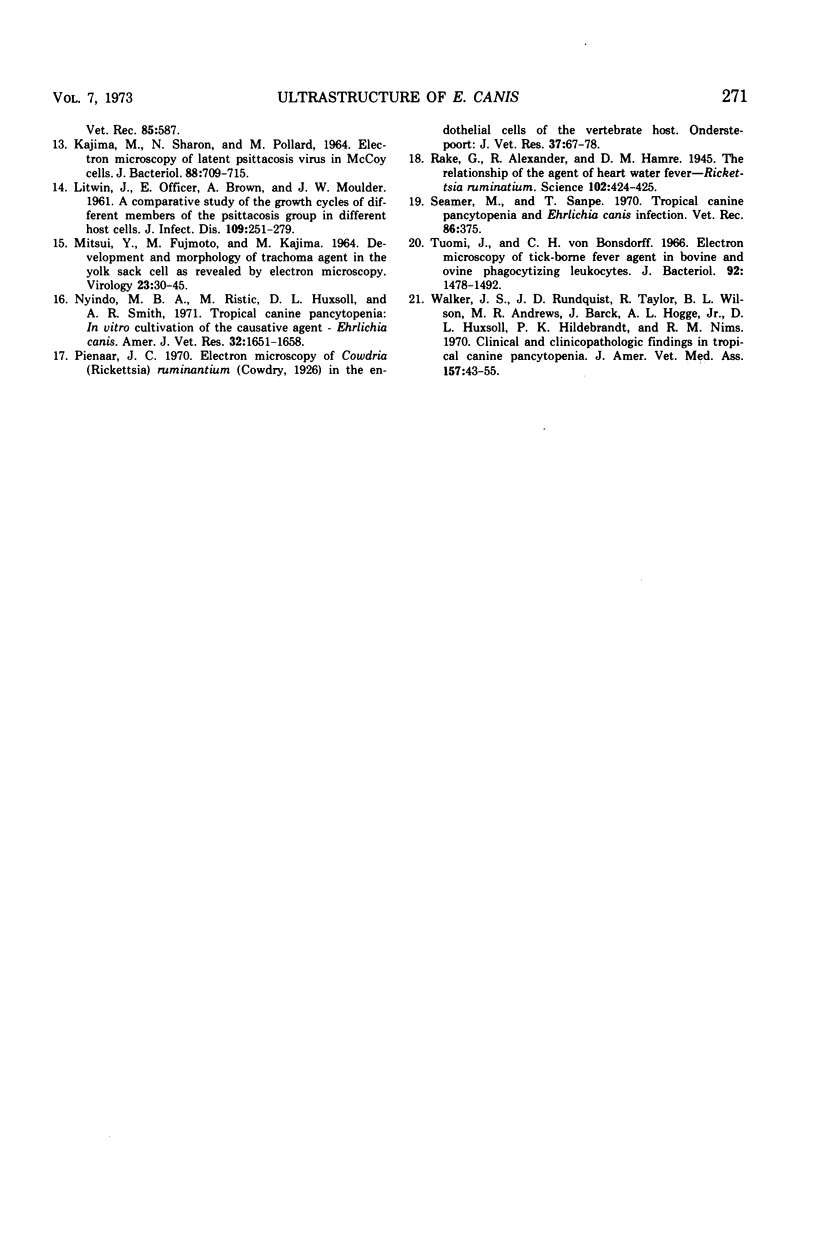
Images in this article
Selected References
These references are in PubMed. This may not be the complete list of references from this article.
- ARMSTRONG J. A., REED S. E. NATURE AND ORIGIN OF INITIAL BODIES IN LYMPHOGRANULOMA VENEREUM. Nature. 1964 Jan 25;201:371–373. doi: 10.1038/201371a0. [DOI] [PubMed] [Google Scholar]
- Anderson D. R., Hopps H. E., Barile M. F., Bernheim B. C. Comparison of the ultrastructure of several rickettsiae, ornithosis virus, and Mycoplasma in tissue culture. J Bacteriol. 1965 Nov;90(5):1387–1404. doi: 10.1128/jb.90.5.1387-1404.1965. [DOI] [PMC free article] [PubMed] [Google Scholar]
- Armstrong J. A. Relation of PLT organisms to the rickettsiae, with special reference to structure and multiplication. Acta Virol. 1968 Jan;12(1):15–17. [PubMed] [Google Scholar]
- BOOL P. H., SUTMOLLER P. Ehrlichia canis infections in dogs on Aruba (Netherlands Antilles). J Am Vet Med Assoc. 1957 May 1;130(9):418–420. [PubMed] [Google Scholar]
- Cutlip R. C. Electron microscopy of cell cultures infected with a chlamydial agent causing polyarthritis of lambs. Infect Immun. 1970 May;1(5):499–502. doi: 10.1128/iai.1.5.499-502.1970. [DOI] [PMC free article] [PubMed] [Google Scholar]
- Ewing S. A., Buckner R. G. Manifestations of babesiosis, ehrlichiosis, and combined infections in the dog. Am J Vet Res. 1965 Jul;26(113):815–828. [PubMed] [Google Scholar]
- Ewing S. A. Canine ehrlichiosis. Adv Vet Sci Comp Med. 1969;13:331–353. [PubMed] [Google Scholar]
- Gribble D. H. Equine ehrlichiosis. J Am Vet Med Assoc. 1969 Jul 15;155(2):462–469. [PubMed] [Google Scholar]
- HIGASHI N. ELECTRON MICROSCOPIC STUDIES ON THE MODE OF REPRODUCTION OF TRACHOMA VIRUS AND PSITTACOSIS VIRUS IN CELL CULTURES. Exp Mol Pathol. 1965 Feb;76:24–39. doi: 10.1016/0014-4800(65)90021-3. [DOI] [PubMed] [Google Scholar]
- Huxsoll D. L., Hildebrandt P. K., Nims R. M., Amyx H. L., Ferguson J. A. Epizootiology of tropical canine pancytopenia. J Wildl Dis. 1970 Oct;6(4):220–225. doi: 10.7589/0090-3558-6.4.220. [DOI] [PubMed] [Google Scholar]
- Huxsoll D. L., Hildebrandt P. K., Nims R. M., Ferguson J. A., Walker J. S. Ehrlichia canis--the causative agent of a haemorrhagic disease of dogs? Vet Rec. 1969 Nov 22;85(21):587–587. doi: 10.1136/vr.85.21.587. [DOI] [PubMed] [Google Scholar]
- KAJIMA M., SHARON N., POLLARD M. ELECTRON MICROSCOPY OF LATENT PSITTACOSIS VIRUS IN MCCOY CELLS. J Bacteriol. 1964 Sep;88:709–715. doi: 10.1128/jb.88.3.709-715.1964. [DOI] [PMC free article] [PubMed] [Google Scholar]
- LITWIN J., OFFICER J. E., BROWN A., MOULDER J. W. A comparative study of the growth cycles of different members of the psittacosis group in different host cells. J Infect Dis. 1961 Nov-Dec;109:251–279. doi: 10.1093/infdis/109.3.251. [DOI] [PubMed] [Google Scholar]
- MITSUI Y., FUJIMOTO M., KAJIMA M. DEVELOPMENT AND MORPHOLOGY OF TRACHOMA AGENT IN THE YOLK SAC CELL AS REVEALED BY ELECTRON MICROSCOPY. Virology. 1964 May;23:30–45. doi: 10.1016/s0042-6822(64)80005-2. [DOI] [PubMed] [Google Scholar]
- Nyindo M. B., Ristic M., Huxsoll D. L., Smith A. R. Tropical canine pancytopenia: in vitro cultivation of the causative agent--Ehrlichia canis. Am J Vet Res. 1971 Nov;32(11):1651–1658. [PubMed] [Google Scholar]
- Pienaar J. G. Electron microscopy of Cowdria (Rickettsia) ruminantium (Cowdry, 1926) in the endothelial cells of the vertebrate host. Onderstepoort J Vet Res. 1970 Mar;37(1):67–78. [PubMed] [Google Scholar]
- Rake G., Alexander R., Hamre D. M. THE RELATIONSHIP OF THE AGENT OF HEART-WATER FEVER--RICKETTSIA RUMINANTIUM. Science. 1945 Oct 26;102(2652):424–425. doi: 10.1126/science.102.2652.424-a. [DOI] [PubMed] [Google Scholar]
- Seamer J., Snape T. Tropical canine pancytopaenia and Ehrlichia canis infection. Vet Rec. 1970 Mar 28;86(13):375–375. doi: 10.1136/vr.86.13.375-a. [DOI] [PubMed] [Google Scholar]
- Tuomi J., von Bonsdorff C. H. Electron microscopy of tick-borne fever agent in bovine and ovine phagocytizing leukocytes. J Bacteriol. 1966 Nov;92(5):1478–1492. doi: 10.1128/jb.92.5.1478-1492.1966. [DOI] [PMC free article] [PubMed] [Google Scholar]
- Walker J. S., Rundquist J. D., Taylor R., Wilson B. L., Andrews M. R., Barck J., Hogge A. L., Jr, Huxsoll D. L., Hildebrandt P. K., Nims R. M. Clinical and clinicopathologic findings in tropical canine pancytopenia. J Am Vet Med Assoc. 1970 Jul 1;157(1):43–55. [PubMed] [Google Scholar]




